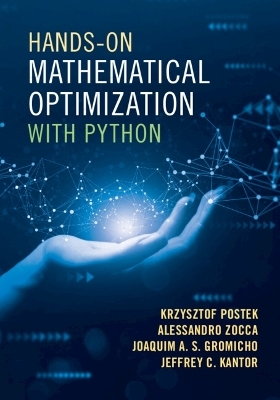
Hands-On Mathematical Optimization with Python
Cambridge University Press (Verlag)
978-1-009-49350-5 (ISBN)
- Noch nicht erschienen (ca. Januar 2025)
- Versandkostenfrei innerhalb Deutschlands
- Auch auf Rechnung
- Verfügbarkeit in der Filiale vor Ort prüfen
- Artikel merken
This practical guide to optimization combines mathematical theory with hands-on coding examples to explore how Python can be used to model problems and obtain the best possible solutions. Presenting a balance of theory and practical applications, it is the ideal resource for upper-undergraduate and graduate students in applied mathematics, data science, business, industrial engineering and operations research, as well as practitioners in related fields. Beginning with an introduction to the concept of optimization, this text presents the key ingredients of an optimization problem and the choices one needs to make when modeling a real-life problem mathematically. Topics covered range from linear and network optimization to convex optimization and optimizations under uncertainty. The book's Python code snippets, alongside more than 50 Jupyter notebooks on the author's GitHub, allow students to put the theory into practice and solve problems inspired by real-life challenges, while numerous exercises sharpen students' understanding of the methods discussed.
Krzysztof Postek is Senior Optimization Data Scientist with the Boston Consulting Group in Amsterdam. He received his Ph.D. in Operations Research in 2017 from Tilburg University. After his postdoc at the Technion – Israel Institute of Technology, he spent several years as a faculty member at Erasmus University Rotterdam and Delft University of Technology. His research interests revolve mostly around optimization under uncertainty. Alessandro Zocca is Assistant Professor in the Department of Mathematics at the Vrije Universiteit Amsterdam. He received his Ph.D. in Mathematics from the University of Eindhoven in 2015. He was a postdoctoral researcher first at CWI Amsterdam, and then at the California Institute of Technology, supported by a NWO Rubicon grant. His work lies in the area of applied probability, learning, and optimization, drawing motivation in particular from applications to power systems reliability. Joaquim A.S. Gromicho acts as Science and Education Officer for ORTEC and is full professor of Business Analytics at the University of Amsterdam. He received his Ph.D. in Optimization in 1995 from the Erasmus University Rotterdam, before spending two years as Assistant Professor at the University of Lisbon. He serves the Dutch Statistics and OR Society as editor in chief of STAtOR, a magazine on applications and impact, and the steering committee of the EURO Practitioner's Forum. Jeffrey C. Kantor earned his Ph.D. in Chemical Engineering from Princeton University in 1981. After a postdoc at the University of Tel Aviv, he joined the Chemical Engineering Department at the University of Notre Dame. His research interests focused on the theory and application of nonlinear control theory and techniques to chemical and biological processes. His awards have included an NSF Presidential Young Investigator Award, a Camille and Henry Dreyfus Research Scholar Award, and is a Fellow of the American Association for the Advancement of Science. He enjoyed modeling for optimization and contributed to the Pyomo community.
1. Mathematical optimization; 2. Linear optimization; 3. Mixed-integer linear optimization; 4. Network optimization; 5. Convex optimization; 6. Conic optimization; 7. Accounting for uncertainty: Optimization meets reality; 8. Robust optimization; 9. Stochastic optimization; 10. Two-stage problems; Appendix A. Linear algebra primer; Appendix B. Solutions of selected exercises; List of Tables; List of Figures; Index.
| Erscheint lt. Verlag | 31.1.2025 |
|---|---|
| Zusatzinfo | Worked examples or Exercises |
| Verlagsort | Cambridge |
| Sprache | englisch |
| Themenwelt | Mathematik / Informatik ► Informatik ► Theorie / Studium |
| Mathematik / Informatik ► Mathematik ► Angewandte Mathematik | |
| Mathematik / Informatik ► Mathematik ► Finanz- / Wirtschaftsmathematik | |
| ISBN-10 | 1-009-49350-7 / 1009493507 |
| ISBN-13 | 978-1-009-49350-5 / 9781009493505 |
| Zustand | Neuware |
| Haben Sie eine Frage zum Produkt? |
aus dem Bereich


